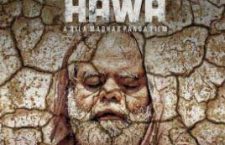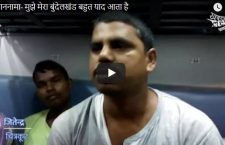Queering and Clearing the Municipality, this Nagar Palika elections season
The elections to local urban bodies in Uttar Pradesh have felt a bit like the twelve days of Christmas – campaigns of colourful characters, revelry, noise, boisterousness – leading up to polling week, with a feeling that anything could happen. In the eastern alpine regions of Europe, back in the seventeenth century, celebrations saw masked men, or children in some places, run the streets to drive out evil spirits, with whips and bells, or by knocking on doors. In Bundelkhand, we had men with brooms going door to door.
It’s just over 6 months since the new BJP government was voted into Uttar Pradesh with a full majority. A local reporter told us, they’re cutting their teeth yet, tell us to wait before we launch into too strong a lambasting of all the things that aren’t working. But democracy is an unrelenting force, and the promises the winning team made were too grand, the picture of change painted too hyperbolic. The local body elections have provided a space for voters and oppositional forces to consolidate and articulate a simmering discontent, muffled for months by a media that was, waiting, let’s say. Promises of relief to farmers in debt, housing, electricity, toilets have been far from held up, and voters in Bundelkhand are furious. Thus the knocking on doors, and the chasing out evil spirits.
In the fray for the seat of chairperson (fine, its Chairman), or the president of the town council, are some charismatic candidates from the Samajwadi Party, a lot of women contesting on non reserved seats, and more transgender candidates than we’ve ever seen in our parts. It feels like politics has got a jolt. Says a fast-talking, and speed-campaigning Mohan Sahu of the Samajwadi party, ‘Of course people’s way of thinking is changing in Banda! The way they thought that caused the results of the 2014 and 2017 elections – this is changing. Kamal ka phool is becoming kamal ka phool, sabse bada bhool. And its not just Banda, it’s the whole state, we’re going to see a change in the whole country! Sahu, like every other candidate, is fixated on the mandate of sanitation – Swacch aur Sundar Banda – in his campaign, as if the current District Magistrate was leaving any stone unturned in this regard. ‘There are bastis in town where, believe you me, you have to cover your nose to walk through. Those are the ones that will be my priority – where the lack of sanitation is visible.’ And if you’re stifling a yawn, as we were, then he has another carrot, wedding halls for the urban poor, and a corruption-free municipal council. No twinge of self-reflexivity, as he echoes the ruling parties mandates in his strongly oppositional campaign.
Cynicism aside, Sahu’s claims that there is already discontent with the party in power are echoed on Whatsapp groups in Banda. For instance, when the BJP MLA Prakash Dwivedi (responding to a call by his high command in Lucknow, that MLAs ensure this win for the BJP in the urban body polls) posts live reports of his campaigns alongside BJP candidates for the position of president of the town council, and talks about the ‘fast speed of development’ possible when central, state, and local bodies all are led by the same party, far from unanimous appreciation and blind sharing, these now are countered by, ‘Banda has a BJP chairman already, and big difference that makes!’
Political parties have something to learn from young voters in Mahoba, like Abhishek Yadav, who feels strongly that this time around, electronic voting machines should be replaced by paper ballots, so that there will be no opening for doubt about the results of this election, no funny business caused by election machines. This in reference to the controversy about the voting machines being tampered with in the assembly elections, and conspiracy theories and blame games deflecting from an actual analysis of election results. ‘No parties should be able to use this as an excuse to complain. If you use ballot papers, you can see everything clearly, who the people’s choice is.’ His own choice reflects the signs o’ the times, with subtle, refreshing directness. ‘We want a leader who doesn’t discriminate. On caste, on religion. Who only works for the people.’
The candidate who has made the jhaadu a symbol to take note of is AAP candidate Shravan Kumar, urf Lallu Sahu of Kabrai town in Mahoba. The jhaadu is the goddess Lakshmi of your home, you take it up first thing in the morning, and only if your home is clean will Lakshmi visit,’ says he, in a refreshingly Bundelkhandi take on sanitation rhetoric. His pet peeves are dust and rust coated fogging machines, which he aims to put into service to fumigate his town, and open drains, both a sanitation and child-and-animal hazard (both of which are in no short supply on Kabrai’s quarry dust coated and potholed roads). Sahu was a BSP party member, but claims to have not met the party’s expectations in the previous elections, and so not been offered a ticket. (This self deprecation is soon followed up by, ‘the mafia cut me out of a seat, the BSP politicians have no hold on what’s going on on the ground reality.’)
That the election is a more full and pulsating one than we anticipated – from the barely heard resistance in the hinterland over the last 6 months, and from the Chinese whispers across social media – has been a pleasant surprise. As have been the questions about misuse of campaign funds by a BJP candidate (6 lakhs for the chairperson’s post), when mini trucks (called baby elephants) with loudspeakers were spotted around Banda, campaigning for him, instead of the regulation loudspeakers with headphones. No peep out of the district administration, usually so alert (especially if you’re caught defecating in the open!) – but this was noted by media, and voters, no doubt.
What has been the best surprise, is the number of repeat women candidates standing for the position of president of the town council. Unlike elections past, many of the candidates we have seen are vocal, confident political figures, with a clear idea of why they want to be in the posts they are standing for. No spokespersons for them! Savita Modanwal, who looks like butter wouldn’t melt in her mouth, the owner of a small halwai in Rajapur, Chitrakoot, who has been in politics for years, says that a woman’s place is not within the home, and she wishes more women would be like her. Forget generic election mandates, her promise is to link benefits available to people in her town. Krishna Singh, an independent candidate from Lalitpur, is so diametrically different from any male candidate we have interviewed, that we can’t help but smile at her beatific chant, ‘I’m open to everyone’s suggestions on what development needs to be done. This is an election of the people, and I’m standing because people wanted me to, pushed me to.’ The striking and more than confident Gulshan Bindu, a kinnar from Ayodhya on a Samajwadi ticket, ironically was one of the few candidates with a spokesperson, with a movie-styled script for her: ‘She can go to church and bow her head, read the Quran, say Wahe Guru…is neither Hindu nor Muslim. She’s come to Ayodhya to spread the feeling of humanity…’
Watch our Facebook Live on and with women candidates this election season
And there are first-timers too, basking in the mellow glow that only comes with a “pehla nasha”-styled stab at power, such as the beatific Anjum Khatun, who is representing the BSP in Mahoba, and is quick to negate the usual corruption allegations that come Behenji’s way. “This is a rumour”, she laughs a delicate laugh, “Nobody in this party can buy tickets.” The wife of a local hotelier-contractor – and “janta sevak”, adds a hanger-on in the background, hastily – Anjum cites the “bijli-paani” problems she wants to work on, if elected. Those, and violence against women. She brushes aside a curious reporter’s “hobbies” question, and defines “netagiri” alone as her personal passion.
It’s Neelam Karwariya, erstwhile chairperson of Karwi town, who lingers on in our memory. ‘All candidates bring their hopes onto the election ground,’ she says, and, as a daughter-in-law of a long-running political family in town, a member of a teeming democracy and a poet, ‘then it is the decision of the people’.
This election season, we have great hope too, in the decision of the people, to set the balance right, to voice dissatisfaction and dissent, to vote, once again, for accountability, and for change.



